“We don’t just inform – we make the world move,” this phrase, which was heard during the final discussion of the National Union of Journalists of Ukraine‘s project (NUJU) to strengthen interaction between media and communities, best reflects the mission of local media in modern realities. From rescuing homeless animals to defeating corruption schemes, from building ramps for people with disabilities to integrating internally displaced persons – regional newsrooms prove every day that true journalism changes lives.
In the context of war and economic challenges, Ukrainian media found themselves facing a dilemma: how to remain financially independent, keep their finger on the pulse of the community, and at the same time not turn into an instrument of political influence? The answer was the NUJU project, the Ukrainian Media Fund, and the German Marshall Fund of the United States, aimed at strengthening the connection between media and their audiences.
Participants in the final meeting – managers and journalists from 15 newsrooms from all over Ukraine – shared their stories of success, stories about challenges, and, most importantly, tangible results of their work. From remote villages in the Kherson Region, where electricity is being restored under shelling, to modern, inclusive spaces in Lviv – each story became proof that in the era of disinformation and fakes, local media remain islands of trust and an effective agent of positive change.
As noted by project manager Iryna Khromenko, NUJU‘s cooperation with the Ukrainian Media Fund has been going on for three years. During this time, media support has evolved: in 2022, it was emergency assistance to newsrooms affected by hostilities and the economic crisis, and in 2023, the emphasis shifted to technical capacity and resilience. In 2024, support was received by media that “demonstrated adaptability and resilience, a desire for development.”

“During the year, 25 newsrooms participated in the project. Some media outlets participated in all three stages, some in only one or two. During this period, 520 materials were created with a total audience of over 6 million people. The total single circulation of only print media participants in the project amounted to over 100,000 copies,” emphasized Iryna Khromenko. “More than 70% of project participants reported an increase in their audience.”
Inclusion and accessibility: overcoming physical and psychological barriers
One of the most successful were projects dedicated to inclusion and accessibility. Yula Bielska, project manager of the radio station Radio Halychyna FM, spoke about the series of radio programs Dialogue of Equality, which raised the topics of equal opportunities, accessibility of education, the rights of people with disabilities, and the fight against stereotypes.

“Behind every number in the report is a human story. For example, after hearing how to get a job, a person with a disability turned to an employment center after the broadcast, and they helped her fill out her resume. Someone joined sports training in inclusive sections. A blind person who had been at home for months learned about excursions for people with visual impairments,” Yula Bielska said.
The Sarnenski Novyny newspaper focused on overcoming physical barriers in the community. As the editor-in-chief, Svitlana Liashko, said, their project was aimed at creating an accessible environment for people with disabilities. Thanks to the publications and appeals of journalists, the city authorities began to work more actively on arranging ramps, convenient pedestrian crossings, and installing elevators in public buildings.
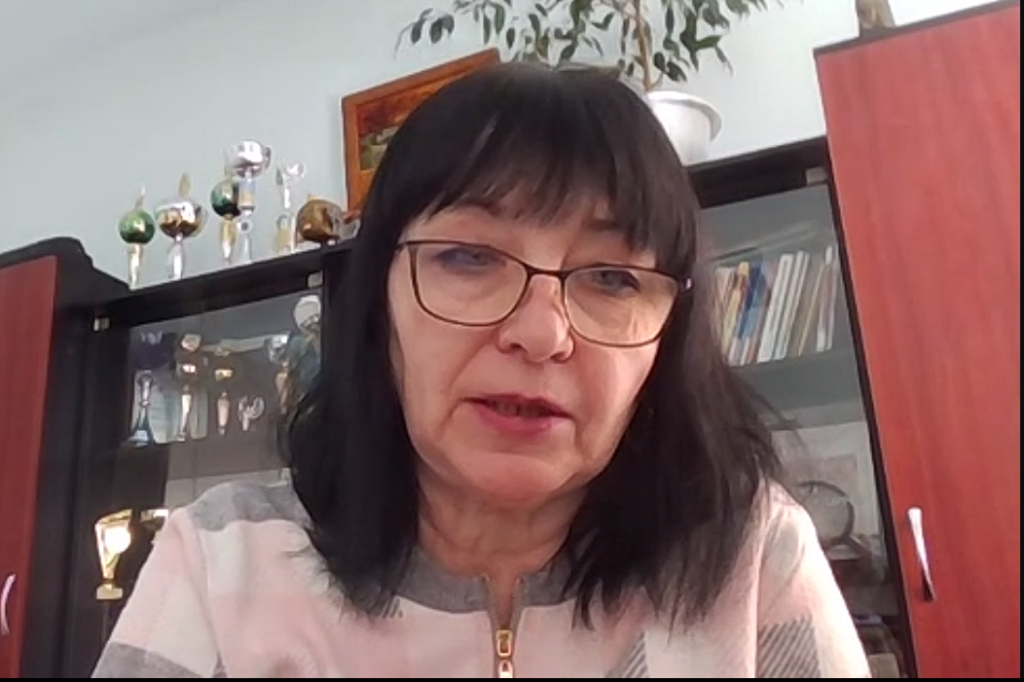
“After numerous appeals to the accessibility council and the community deputies, we managed to get the problem resolved from the ground up. Even such expensive projects as installing an elevator in the hospital began to be implemented. Previously, patients had to be carried to the third floor in their arms,” noted Svitlana Liashko.
Control of the authorities and solving community problems
The RAI television and radio company from Ivano-Frankivsk used the project to update its The Power of Words show. According to the director of RAI, Andrii Rusyniak, this is a large-scale two-hour broadcast, during which up to 30 people gather in the studio – experts, public activists, and government representatives. One of the first projects was a discussion of the heating season problem in the Burshtyn Community, where a large power plant is located, which has been subjected to numerous russian shelling.

“Thanks to such “push” from the media, thanks to our project, the city received funds from the Reserve Fund. The authorities are forced to react when public activists discuss problems live on air. And then the news service monitors what was done after the broadcast,” Andrii Rusyniak emphasized.
The online media Procherk from Cherkasy monitored the implementation of public budgets, which the local authorities tried to reduce under the pretext of war.
“At the beginning of the project, they dismissed us, saying that we were at war and “there is no need to shake anything up.” But later, representatives of the financial department and departments of the city council began to contact us to explain the situation with public budgets,” said the head of the publication Nazarii Vivcharyk.

The Lviv online publication Leopolis focused on monitoring purchases, tenders, and the allocation of land plots.
“In fact, the city has funds, while the city takes out loans, it is not clear why. Our journalist goes to the sites and checks the tenders. Recently, one of the Lviv schools announced a tender for the repair of stairs for the amount of UAH 600,000. The stairs were two by three meters long. After our publication, the tender was canceled,” said the editor-in-chief of the publication, Andrii Bolkun.

Ivan Harahonych, the head of the publication Panorama (Zakarpattia), shared his experience in implementing projects aimed at studying the needs of the audience.
“For us, the project was important in terms of establishing greater communication with the audience and studying its needs. The first part of the project was dedicated to employment – we talked about vacancies in Zakarpattia and successful cases of job search. At the beginning of the heating season, we focused on this topic at the request of readers. A good indicator of the success of the project was the increase in views on the site,” he said. During the project, the audience of Panorama on Facebook grew from 300,000 to 313,000 subscribers, which is a significant result for an already large publication.
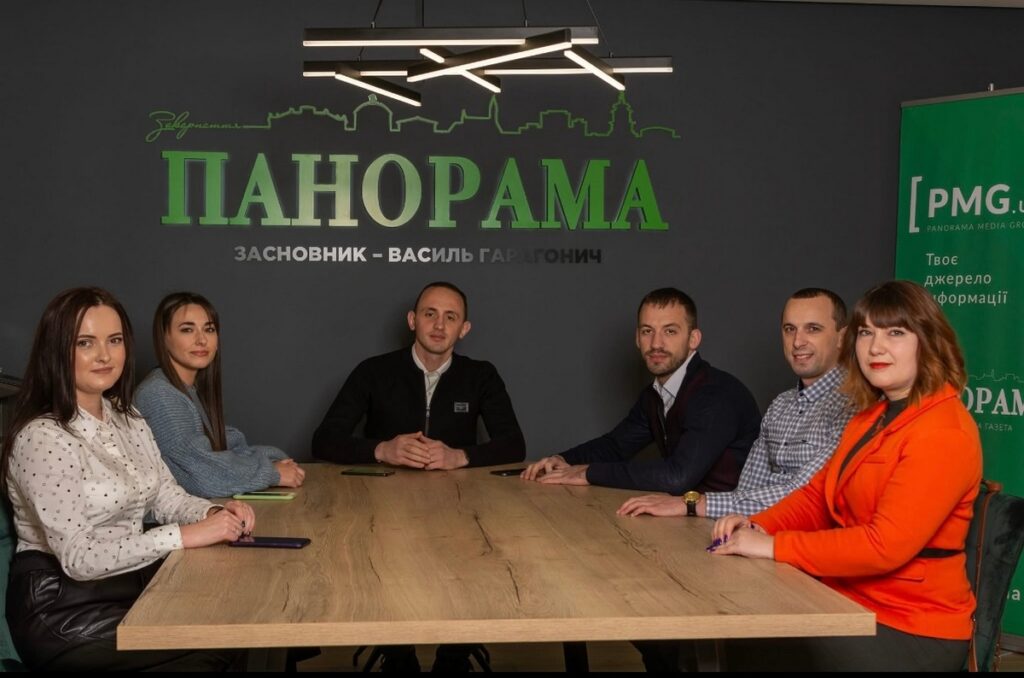
Working in front-line zones: special challenges
Particular attention was paid to media resources from front-line territories. Anatolii Zhupyna, the head of the Novyi Den publication from the Kherson Region, spoke about working with communities living in conditions of constant shelling and lack of communications.

“We are forced to talk about how people survive without water, gas, and electricity. They are most interested in how to get compensation for destroyed housing. Their problems are acute, and there are many of these problems. We are glad that as a result of our publications, we managed to restore bus services in some areas of the region,” he noted.
Tetiana Velyka from Huliaipole, the editor-in-chief of Holos Huliaipillia (Zaporizhzhia Region), focused on the topic of restoring destroyed communities.
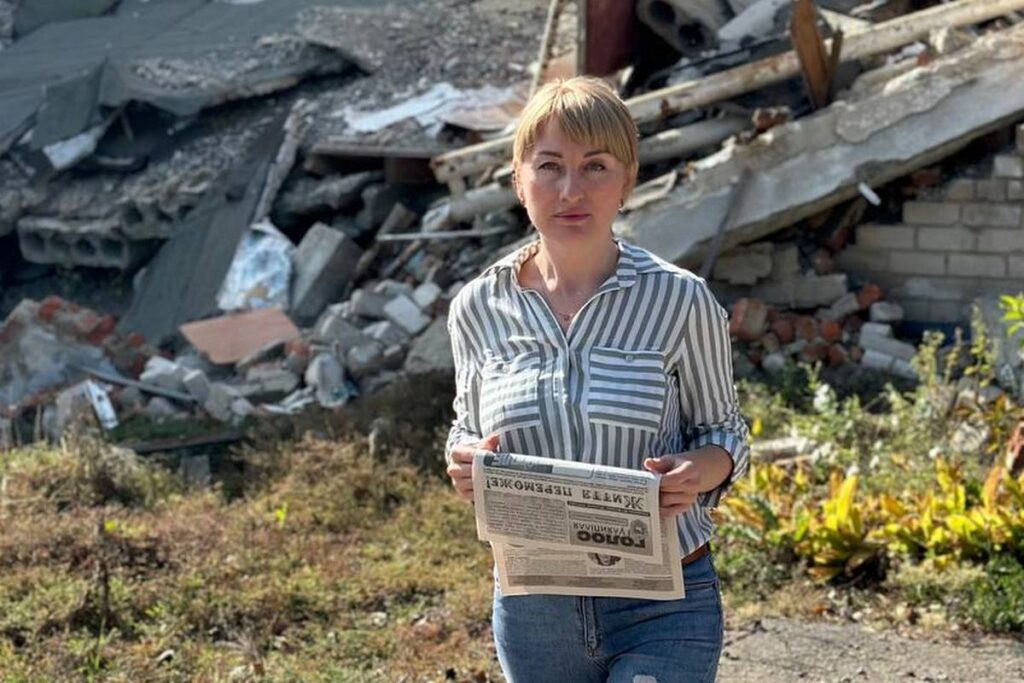
“At first, I was worried that there was nothing positive to write about in front-line communities. But later, it turned out that one of the communities in the region was able to join the eReconstruction program. Residents began to receive the first funds for the reconstruction of destroyed housing,” said Tetiana Velyka.
Integration of displaced persons and adaptation of IDPs
Several media outlets devoted their projects to the topic of internally displaced persons (IDPs). Valentyna Blyzniuk, the editor of the newspaper Vilnyi Holos from Kolomyia, Ivano-Frankivsk Region, spoke about the project on the integration of displaced persons.

“At first, we wrote about housing for IDPs, then – how to feel at home in a foreign community. And now we are talking about unique people among IDPs who not only adapted but also became community leaders,” she shared.
The newspaper Vysokyi Zamok from Lviv also worked on the topic of displaced persons.
“Thanks to the project, we were constantly looking for new topics, stories, and heroes. This stimulated the editorial staff to work more actively,” noted the editor of the publication, Nataliya Baliuk.

Results for editorial staff: audience growth and financial sustainability
All participants noted the growth of the audience and improved communication with readers.
“During the project, the audience of our digital platforms has increased significantly: +30% on Facebook, +25% on Instagram, +35% on TikTok, the YouTube audience has doubled,” shared Maryna Zabiyan, a representative of the publication Visnyk Ch from Chernihiv. She also added that the publication’s digital platforms have begun to be monetized. Within three months, thanks to publications prepared and posted during the project, Visnyk Ch received USD 250.

An important result was also financial support for the very existence of the newsrooms.
“The project funds helped to maintain our media, maintain the sustainability of our work. We invested all the money in printing the newspaper and formed a financial safety cushion for the following months,” said Vira Iliyina, a representative of the publication Technopolis from the Donetsk Region.

Most newsrooms plan to continue the initiatives they have started even after the funding ends.
“We will continue this project, launched with the light hand of the Union of Journalists, regardless of whether there will be financial support because we see the result, we see what awaits us,” emphasized the head of the Chernivtsi media agency A.S.S., Oksana Danyliuk.
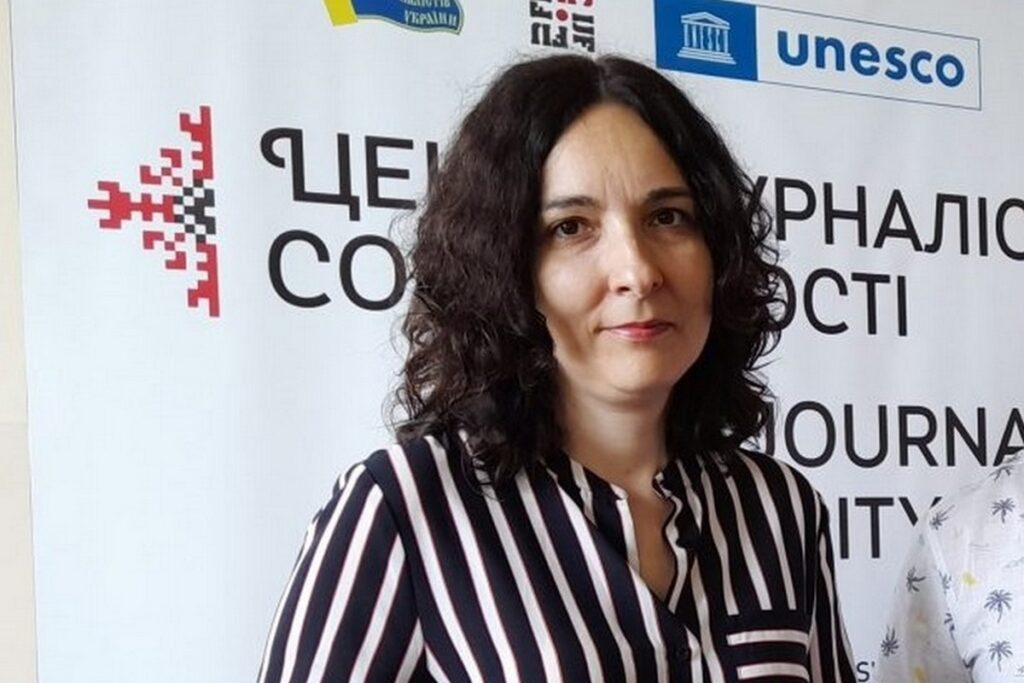
The participants in the discussion emphasized the importance of long-term support for the media instead of short-term grants.
“Short-term grants often exhaust the media due to constant reporting and a frantic pace of work. On the other hand, long-term support contributes to the sustainability of newsrooms, allowing them to plan their work for the future,” emphasized Iryna Khromenko.
And Andrii Rusyniak added that for his media, “tomorrow and the day after tomorrow are important.”
“If you are sure that at least two or three people receive a salary thanks to this support, then there is no chance of not working – everyone gets involved in the work,” he emphasized.
According to the participants, during meetings with international partners, the NUJU leadership always emphasizes the need for this format of cooperation.
Overall, the project demonstrated that regional media are able to develop, switch to digital platforms, increase their audience, improve their technical skills and financial sustainability, and, most importantly – can be not just a source of information but also a powerful tool for positive changes in their communities. By identifying problems, establishing communication between the authorities and citizens, and implementing innovative initiatives, newsrooms help create stronger, more cohesive communities.
“The success of regional media largely depends on their ability to satisfy the information needs of the audience and solve real problems of communities through dialogue and cooperation,” summed up the project manager Iryna Khromenko.
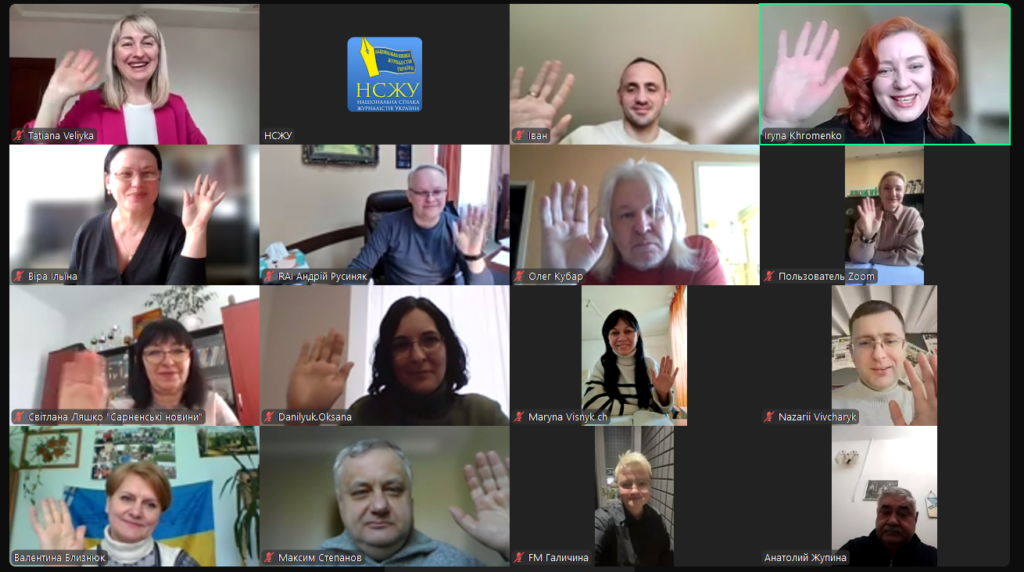
Support to the Ukrainian Media Fund: Key Achievements 2022-2024
- 2022 – Emergency Response: 47 media outlets supported, 600+ unique stories of resilience in wartime created, reaching over 4 million audiences. Key projects: We are from Ukraine! and Journalists matter!
- 2023 Achievements – Resilience Building: 37 media outlets were supported, 98 media workers received salary support, and 152 salaries were paid in 4 months. Technical support provided: 14 laptops and two printers, 12 high-capacity backup batteries, 70 power banks, and 19 Adobe software licenses.
- 2024: Growth and development: 25 media outlets supported during the year, 520 stories created, 6+ million audience reached, total single circulation of newspapers 100+ thousand copies, over 70% reported audience growth, increased public engagement. Key achievements: sustained growth of digital platforms, increased audience engagement, improved community communication, improved technical skills, increased financial sustainability
NUJU Information Service

 THE NATIONAL UNION OF
JOURNALISTS OF UKRAINE
THE NATIONAL UNION OF
JOURNALISTS OF UKRAINE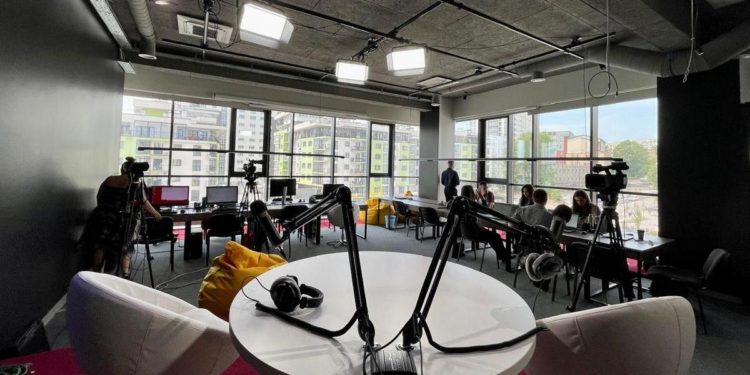
















Discussion about this post